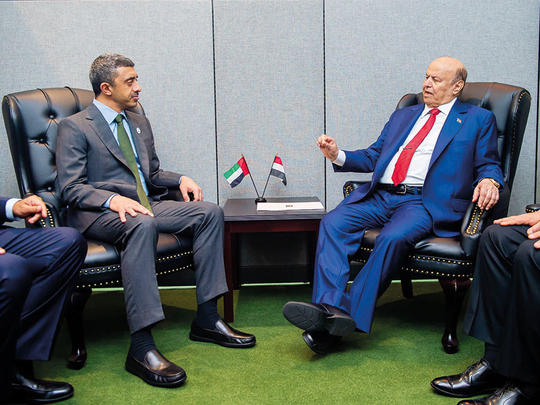
Geveva- A Yemeni activist who was held and tortured for months by Al Houthi rebels this week criticised the UN-backed peace process for his country as “naive”, warning against “humanising” his captors.
Hisham Al Omeisy, an outspoken activist, journalist and political commentator, was arrested in August 2017 after speaking out against restrictions and corruption in rebel-held areas of the war-ravaged country.
Omeisy, who has also harshly criticised the actions of the Saudi-led coalition that has been fighting the rebels since 2015, says the Al Houthis accused him of being an American and Saudi spy.
“I was tortured in prison... They employed barbaric measures,” he told AFP in an interview on the sidelines of the UN Human Rights Council in Geneva.
He warned that UN officials trying to bring both sides to the table to hammer out a peace deal were being “played by the Al Houthis”.
Al Omeisy was finally released in January after an international campaign to secure his freedom. He lives in Cairo but says he still follows the situation at home.
UN mediator Martin Griffiths tried earlier this month to organise the first negotiations between Yemen’s warring sides in two years, but the Al Houthis failed to show up in Geneva.
Al Omeisy said the rebels refusal to come should not have been a surprise, and questioned whether those trying to broker peace sufficiently understand the complexities of the conflict. “The process came off as very naive and overly simplistic,” he said. A major mistake, he said, was trying to “humanise” the Al Houthis.
Al Omeisy said he knew from his time in Al Houthi custody how brutal they were.
“They would hang me from the wall, beat me up. I had cuts and bruises all over my body,” he said, displaying scars on his wrists from metal cuffs and a stab-wound on the back of one hand.
He also had pictures of big, red scars on his back and thigh.
His interrogators demanded that he confess on video to being a spy, but Al Omeisy said he refused, pointing out that if he had given in, “I know I would have been executed”.
He said he was held alone in a tiny concrete cell with no light and no toilet, and was often denied food and water. “They dehumanise you,” he said, adding that he knew of at least 16 journalists who were held in his block. He says he is haunted by their screams.
The UN insists there is no military solution to Yemen’s conflict, but Al Omeisy insisted it would be preferable to go in quickly to retake the areas under Al Houthi control, instead of allowing the conflict to drag on.
He described the Yemen conflict as Syria “on steroids”. While Syria’s war has been raging for more than seven years, he warned that Yemen’s conflict could “drag on for 70”.
The UN process was “flawed”, he said. “You need something beyond just good intentions. You need a solid strategy, and you need a solid implementation.”
Meanwhile, Yemen’s government on Thursday announced it will end its cooperation with a UN human rights mission, accusing investigators of bias after a report on alleged war crimes.
“The government refuses to extend the mission’s mandate because its findings, outlined in the report, did not meet the standards of professionalism and impartiality or the basic principles of the United Nations,” said a statement carried by the state-run Saba news agency.
It accused the UN group of “turning a blind eye” to the violations of the Al Houthis, who the government has been battling since 2014.
The Saudi-led coalition has dismissed as “inaccurate” and “non-neutral” the UN experts’ August 28 report, which accused both government forces and the Al Houthis of violations against international law.












